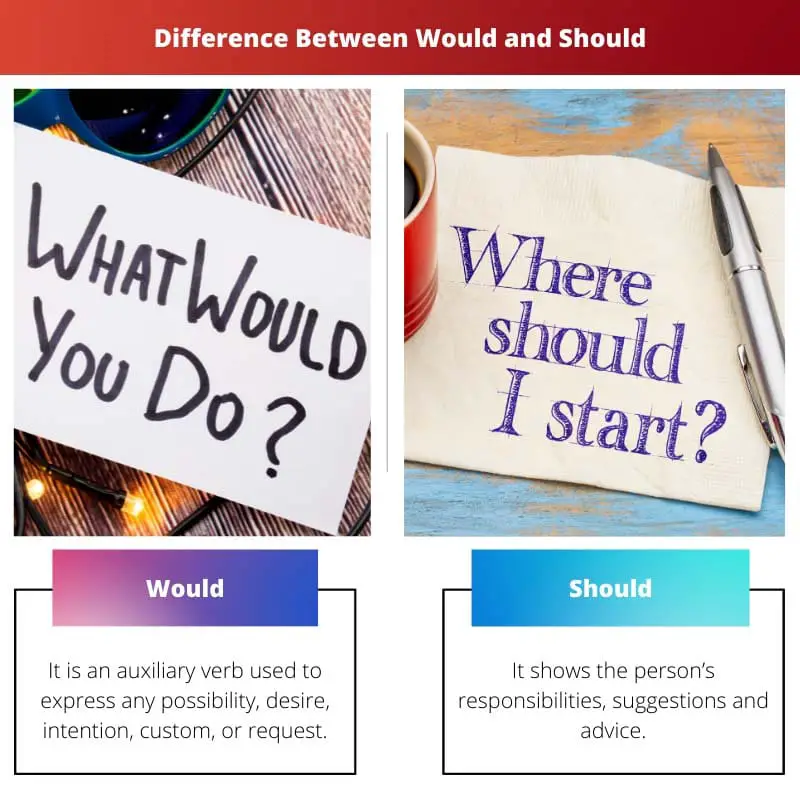One of the most used languages globally is the language English. While English is the first language in most countries, every other country uses it as a second language.
English is now recognized as an international language, and one should definitely know the language while travelling to any foreign country to minimize the communication issues which can arrive.
Some words in English can be used interchangeably as they have the slightest difference in meaning, and the proper grammatical usage of the words is not known to the people.
One such example is the use of auxiliary verbs, would and should.
Key Takeaways
- “Would” is used to express willingness or preference, while “should” is used to indicate obligation or duty.
- “Would” is used to talk about hypothetical situations, while “should” is used to give advice or make suggestions.
- “Would” is the past tense of “will,” while “should” is the past tense of “shall.”
Would vs Should
“Would” is the past tense of “will” and is used to express a hypothetical situation or to describe something that occurred in the past. “Should” is used to express a recommendation, obligation, or expectation, and it is used to suggest what someone ought to do or to offer advice.

Would is an auxiliary verb and is the past tense of the verb ‘will’. It is used to show the desires, abilities, or willingness of a person. E.g. They would have gone to the movies last night.
I would have cleaned the room. It is sometimes also used to explain the intention behind an action or situation.
Should is the simple past tense form of the word ‘shall’. It is considered an auxiliary verb and has very few uses. Should is used in cases when you have to ask what is the right thing to do.
Sometimes, it is used in the formation of a question, such as Should I ask my brother to go to the grocery store with me?
Comparison Table
| Parameters of Comparison | Would | Should |
|---|---|---|
| Meaning | It is an auxiliary verb used to express any possibility, desire, intention, custom, or request. | It shows the person’s responsibilities, suggestions, and advice. |
| Root verb | Will | Shall |
| Nature of speech | Informal | Formal |
| Tense form | Past tense, sometimes used for reference to future tense. | Simple past tense |
| Usage | Used in case of hypothetical situations, asking questions, or while making requests. | Used in indirect speech to give suggestions, recommend something, or to advise something. |
What is Would?
Would is the past tense of the ‘will’, which is a modal verb. Would is used as an auxiliary verb and is used to express any kind of possibility, desire, intention, custom, or request.
One can use the word ‘would’ to make polite requests, to express hypothetical questions, or to ask questions. For example, Would you like a cup of ginger tea? John would go to the bank to withdraw cash.
Would is used to talk about a possible situation or an imaginary situation. It is used to describe situations that have a low probability of happening.
For example, Sheela would visit her grandmother’s house on Sunday if she had a car (it shows a situation that would happen if the person had a car).
Sheela would visit her grandparents on Sunday, but her friends are in town to meet her (It shows that the person is willing to visit her grandparents, but her friends are in town to meet her).
Some examples of the for usage of ‘would’ are:
- What would you do if you won the lottery?
- Who would be the net chairman of the company?
- Would you like to stay for lunch?
- I would go to Disneyland this weekend with my friends.
- I would love to visit Paris someday.

What is Should?
Should is the simple past tense form of shall and is used as an auxiliary verb. Should is used to address obligations, expediency, deduction, and propriety.
It is also used while expressing any sort of ideas, to express preferences, give advice, suggestions, and recommendations. E.g. Charu should focus more on her career at this stage of life.
Ritika should visit her parents on Sunday. (This suggests more like Ritika has to go meet her parents, and Sunday sounds a nice option).
It should is used in cases to show obligations. You should complete this work. ‘Should’ is also used in cases when giving advice to someone. You should visit your physician once in a while.
The auxiliary verb can also be used in cases while describing an expecting moment. The food delivery should be here in an hour. A conditional statement also uses the auxiliary verb ‘should’. If I won the lottery, I should buy a house first.
Some examples of the usage of ‘should’ are:
- Ritu should be in the hall by 3 PM.
- Should we make a U-turn to reach the store?
- You should stop eating street food now.
- You should go to the park street tomorrow.

Main Differences Between Would and Should
- Would is the past tense of the modal verb ‘will’ while should is the past tense of the modal verb ‘shall’.
- Would is sometimes used in the indication of the future but should isn’t used for reference in future.
- Would is used in cases of hypothetical situations, while should is used in cases of obligations.
- Would is used in an informal speech, while should is more formal.
- Would is used for a situation with low probability or any assumption. Should is used when one is making a decision or making the right choice.

- https://www.degruyter.com/document/doi/10.1515/9783110883282.47/html
- https://www.jstor.org/stable/4176901

Absolutely, Xreynolds, and not just global, but also online communications where it is the dominant language.